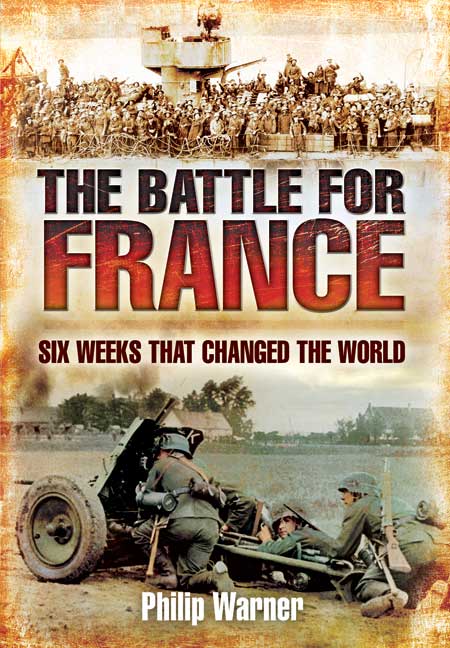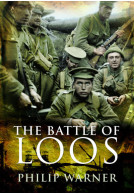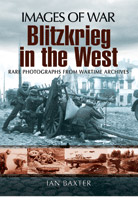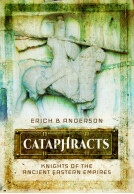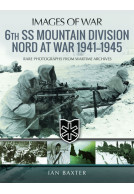The Battle for France (Hardback)
Six Weeks that Changed the World
Imprint: Pen & Sword Military
Pages: 273
ISBN: 9781848843134
Published: 30th April 2010
Last Released: 28th April 2010
(click here for international delivery rates)
Order within the next 5 hours, 45 minutes to get your order processed the next working day!
Need a currency converter? Check XE.com for live rates
| Other formats available - Buy the Hardback and get the eBook for free! | Price |
|---|---|
| The Battle for France ePub (3.0 MB) Add to Basket | £6.99 |
After the long winter of the Phoney War the invasion of the Low Countries and France by Hitler’s rampaging armies threw the World into crisis. Chamberlain’s Government fell, Churchill became Prime Minister. France was humiliated, the British Expeditionary Force was only saved by the miracle of Dunkirk but many men and huge amounts of equipment were lost to the Blitzkrieg. England trembled but the invasion never came.
Philip Warner graphically recounts the momentous events of that terrible period thanks to his painstaking research and skilful writing. He demonstrates how the under trained and ill-equipped British forces gallantly but futilely resisted the German land and air onslaught. He emphasises the understated contribution of the French.
This book provides a fresh and invaluable explanation of the military and political events of that extraordinary campaign, which continued on after Dunkirk.
Philip Warner wrote a prolific number of works of classic military history many of which are in print with Pen and Sword Books, such as Horrocks, Auchinleck and The Battle of Loos. His son Dick lives in West London and runs Class Publishing.
After the long winter of the Phoney War the invasion of the Low Countries and France by Hitler's rampaging armies threw the World into crisis. Chamberlain's Government fell, Churchill became Prime Minister. France was humiliated, the British Expeditionary Force was only saved by the miracle of Dunkirk but many men and huge amounts of equipment were lost to the Blitzkrieg. England trembled but the invasion never came. Philip Warner graphically recounts the momentous events of that terrible period thanks to his painstaking research and skilful writing. He demonstrates how the under trained and ill-equipped British forces gallantly but futilely resisted the German land and air onslaught. He emphasises the understated contribution of the French. This book provides a fresh and invaluable explanation of the military and political events of that extraordinary campaign, which continued on after Dunkirk.
Spartacus Review
This is a reprint of Philip Warner's 1990 book which was, and still is, a fine, comprehensive account of the Battle of France.
Reviewed by John Grehan, Britain at War
Warner opens with an investigation into the politics of the inter-war years. The German economy and its social and political structures had been so severely damaged after the First World War that it was believed in France that, regardless of Hitler's blustering, the Germans would never again be so foolish as to cross swords with the combined might of France and Britain. This led to
what the author defined as the "decade of illusion". Unfortunately for the world, many of the people in positions of power in 1939 were those that had been the most deluded.
The consequence of this was the unexpected and overwhelming German victory. Mr. Warner describes the actual battle more from a British perspective than an Allied one and much attention is paid to the retreat and evacuation of the British Expeditionary Force, including the evacuations from France after Operation Dynamo. Yet, as the sub-title reveals, the theme of the book is the effect the fall of France had upon world affairs.
The speed and ease of the German victory allowed Hitler to mount his fatal invasion of Russia. If, as in the First World War, the Germans had become bogged down for years in France, Hitler would not have been able to conduct, or even contemplate, an attack upon Russia. Nor would he have sent his troops to seize Greece or the Balkans. Also, had the Germans not succeeded so well in the fighting in France it is unlikely that Italy would have declared war. Mussolini, like Franco in Spain, may have sat cautiously on the fence.
But it is the impact of Hitler's invasion of Russia that was to have the most profound consequences.
The author ends his book by considering what would have happened if the Battle of France had dragged on for years. France, Germany and Britain would have become so weakened that Stalin might have had little difficulty in overwhelming all three combatant countries. "Perhaps, by collapsing in 1940", he concludes, "France saved the world from an Orwellian nightmare future".
After the long winter of the Phoney War the invasion of the Low Countries and France by Hitler's rampaging armies threw the World into crisis. Chamberlain's Government fell, Churchill became Prime Minister. France was humiliated, the British Expeditionary Force was only saved by the miracle of Dunkirk but many men and huge amounts of equipment were lost to the Blitzkrieg. England trembled but the invasion never came. Philip Warner graphically recounts the momentous events of that terrible period thanks to his painstaking research and skilful writing. He demonstrates how the under trained and ill-equipped British forces gallantly but futilely resisted the German land and air onslaught. He emphasises the understated contribution of the French.
reenacting ww2 magazine
This book provides a fresh and invaluable explanation of the military and political events ^59§3 extraordinary campaign, which continued on after Dunkirk. Price £19.99
About Philip Warner
Philip Warner (1914–2000) enlisted in the Royal Corps of Signals after graduating from St Catharine’s, Cambridge in 1939. He fought in Malaya and spent 1,100 days as ‘a guest of the Emperor’ in Changi, on the Railway of Death and in the mines of Japan, an experience he never discussed. A legendary figure to generations of cadets during his thirty years as a Senior Lecturer at the Royal Military Academy, Sandhurst, he will also be long remembered for his contribution to more than 2,000 obituaries of prominent army figures to The Daily Telegraph. In addition he wrote fifty-four books on all aspects of military history, ranging from castles and battlefields in Britain, to biographies of prominent military figures (such as Kitchener: The Man Behind The Legend, Field Marshal Earl Haig, Horrocks: The General Who Led From the Front (Pen & Sword, 2018) and Auchinleck: The Lonely Soldier (Pen & Sword, 2006) to major histories of the SAS, the Special Boat Services, Phantom and the Royal Corps of Signals.







